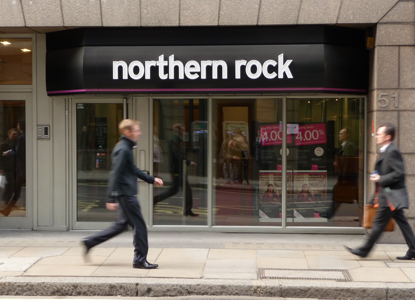By Richard Johnstone | 16 November 2012
The Treasury’s slow reaction to the financial crisis meant that taxpayer losses were almost inevitable following the nationalisation of Northern Rock bank, the Public Accounts Committee has said.
 In a report published today, the MPs examine the government’s takeover of the bank in February 2008, which followed a run on its deposits in September 2007. They conclude that the Treasury took too long to nationalise the bank. Following the run on branches, the government spent five months trying to find a private sector buyer before giving up. When it did nationalise, it then failed to effectively challenge the inherited business plan, first after nationalisation in 2008 and again in 2009.
In a report published today, the MPs examine the government’s takeover of the bank in February 2008, which followed a run on its deposits in September 2007. They conclude that the Treasury took too long to nationalise the bank. Following the run on branches, the government spent five months trying to find a private sector buyer before giving up. When it did nationalise, it then failed to effectively challenge the inherited business plan, first after nationalisation in 2008 and again in 2009.The government eventually decided to split the firm in two. A new retail bank, Northern Rock, was formed and offered for sale, and a separate, so-called bad bank, Northern Rock Asset Management, was created to run down the majority of the mortgage assets.
Northern Rock was sold to Virgin Money last year, and the Treasury expects to receive a total of £931m from the sale. This means that there is an expected loss of £469m to the taxpayer on the bailout deal, the MPs said. The government eventually hopes to recover all the public funds provided but the MPs say this is far from certain as it relies on a profitable wind-down of the bad bank to offset the loss on the sale of Northern Rock.
Even if the Treasury’s predictions are correct, there will still be an economic loss – estimated at £2bn in net present cost – to the taxpayer from the assets remaining in public ownership for years ahead without guaranteed returns.
In the PAC report, The creation and sale of Northern Rock plc, the MPs highlight ‘huge challenges’ remaining in managing taxpayer stakes in both the Royal Bank of Scotland and Lloyds Banking Group. These are currently held by the Treasury-owned UK Financial Investments.
There is no guarantee that the £66bn spent purchasing shares in RBS and Lloyds will ever be recovered, the report says. It is vital that decisions on the future of both stakes are made with value to the taxpayer taking precedence.
The report also urges the Treasury to be more prepared to deal with any future crisis, whatever form it may take, when it emerges.
Committee chair Margaret Hodge said the department had been ‘unable to respond promptly when the banking crisis hit because it lacked the right skills and understanding’.
She added: ‘It was slow to nationalise the bank and that made a loss difficult to avoid.
‘The Treasury had spent five months trying to find a private sector buyer before giving up. After nationalisation, it then failed to effectively challenge the optimistic business plan put forward by the bank’s management to split the bank. UKFI took over management of the taxpayers’ shares in 2010, but it was also too slow to challenge the strategy of Northern Rock even though the bank was losing money.’
She added that the fact that there were only two bidders for Northern Rock ‘does not fill us with confidence that the taxpayer will make a profit on the sale of the two banks which remain in public ownership, RBS and Lloyds. There is a risk that the £66bn invested in RBS and Lloyds may never be recovered.’
Responding to the report, aTreasury spokesman said: ‘We will provide a full response to this report in due course. The decision to nationalise Northern Rock in 2008 was taken in the interest of financial stability. The sale of Northern Rock to Virgin Money last year represented good value for money for the taxpayer, and has helped increase high-street competition.’




















